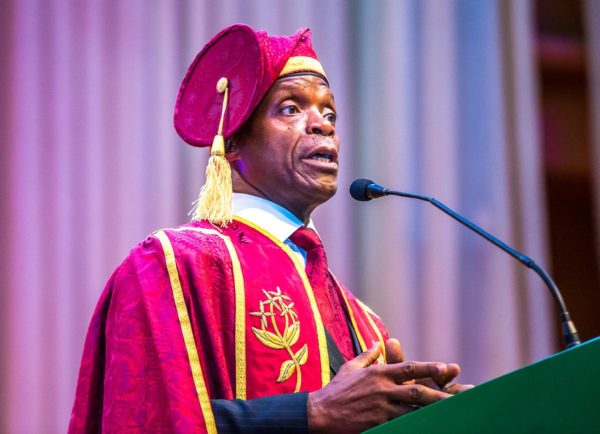Vice-President Yemi Osinbajo on Monday said that Nigeria’s current debt burden, which stands at about 22 per cent of the country’s Gross Domestic Product, ranks among the lowest in the world.
For Osinbajo, the fact that the inflation in Nigeria had stabilised at 11 per cent over the past six months is another pointer that the economy is moving on a positive trajectory.
The vice president spoke while delivering the University of Lagos in Akoka. convocation lecture with the theme, “Nigeria Rising: The Path to Prosperity.”in Lagos.
The occasion was the 50th convocation of the university.
According to him, “We restored medium-term planning with the Economic Recovery and Growth Plan which served as a useful loadstone in improving macroeconomic performance, boosting the real sector of the economy and building infrastructure. The decline in growth, which started at the end of 2014, has been reversed, inflation has stabilised at about 11 per cent over the past six months and our current account was in surplus around 1.3 per cent of the Gross Domestic Product last year.
“Our foreign reserves can cover at least six months of import of goods and services and despite understandable concerns, our debt burden is only about 22 per cent of the size of our economy, which is one of the lowest ratios in the world.
“We have very clear objectives. As you know, the problem of our country is not the planning or designing of great projects, it is in the actual implementation. We are fortunate that Muhammadu Buhari is not an orator, he is a doer.”
According to him, under Buhari’s administration, Nigeria’s prosperity means a decent existence for all.
“Second, that prosperity so defined will be attained if we are able to address the issues of extreme poverty, productivity, corruption, the rule of law and the deficiencies in the quality of human resources caused by poor education and healthcare.
“We must have a robust enough healthcare system that ensures that the average person is in good health, an educational system that guarantees education capable of preparing children for the opportunities and challenges of a knowledge economy.
“in planning the path to prosperity, we also took into account the age-old weaknesses of the Nigerian economy and the illusion of prosperity that frequently distorts our understanding of the actual fragility of our economy”.
He said from the beginning it was clear to the Federal Government that it needed to devise an economic plan that prioritised the basic issues with Nigeria’s economy
like the building of infrastructure especially rail, roads, power and ports; productivity as it diversified from oil and gas.
The vice president said that the government was prepared to do more in the fight against public sector corruption and developing a new educational curriculum that emphasises Science, Technology, Engineering, Arts and Maths, and adopting a new approach to resourcing healthcare; putting in place a social investment programme that deals with issues of extreme poverty and unemployment.
Our Economic Recovery and Growth Plan effectively addressed these issues, he said.
On the progress made so far, Osinbajo said the Buhari administration believed that creating an environment for productivity investment in hard and soft infrastructure was crucial.
He assured Nigerians that with the integrity of President Buhari and the commitment of his administration, Nigeria would not derail from its current path to prosperity.
Osinbajo said that if the administration stuck to its agenda in the next two years, Nigerians would see the most significant improvements, in the power sector.
“Industrial Infrastructure is a major component of our economic transformation plan. Project MINE (Made in Nigeria for Export) is the major plank of our industrial policy.
” The idea is to build Special Economic Zones which accommodate industries for local manufacture of goods for which Nigeria has a comparative advantage. These include cotton, garments, leatherware among others, ” he said.
Shortly before delivering the Convocation lecture, Osinbajo unveiled the Mascot for the 26th NUGA games and inaugurated some projects executed by the University.
Some of the projects include the newly constructed Container Building for the University Technology Hub, the Academic Publishing Centre Building, the Faculty of Engineering Lecture Theatre, and the remodelled University Medical Centre.
The vice president said the next four years would feature reforms in the aviation and export and import sectors, just as the regulatory agencies would broaden into business facilitators.
The Chairman on the occasion, Chief Arthur Mbanefo, during his address said the lecture was special because it marked the significant homecoming for the vice president.
On his part, the Pro-Chancellor of the institution, Prof. Wale Babalakin, said the whole essence of an academic environment was to display a diversity of knowledge, as he insisted that “only academics should be in the environment of academics, not a person that sees the academia as a last resort.”














